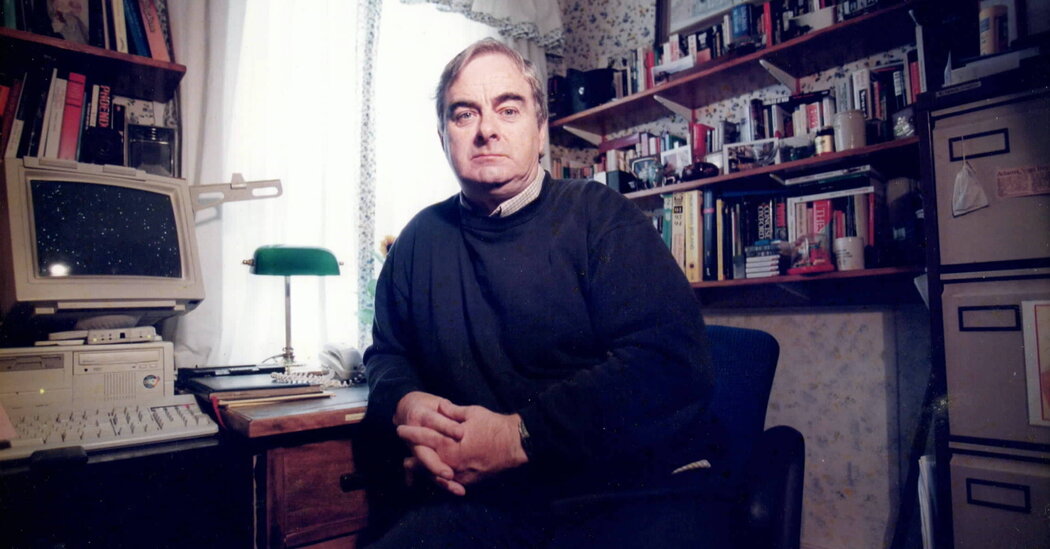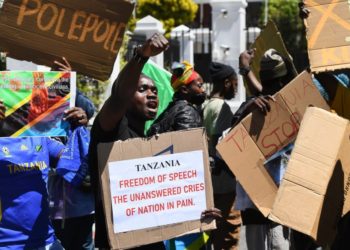Ed Moloney, an authoritative chronicler of the Troubles in Northern Ireland through relentless reporting and deep sourcing on both sides of the bloody sectarian strife that engulfed that small region of the United Kingdom for 30 years, died on Oct. 17 in Manhattan. He was 77.
His son, Ciaran Moloney, said his death, in a hospital, was caused by complications of an infection. He lived in the Bronx.
A reporter, editor, historian and blogger, Mr. Moloney documented the intractable divisions between republicans and unionists in Northern Ireland that led to decades of guerrilla warfare, bombings, terrorism and street fighting. The republicans were mostly Roman Catholics who wanted Northern Ireland to become part of a united Ireland; the unionists were mainly Protestants who wanted to stay with Britain.
“Ed had remarkable sources,” Andy Pollak, who, with Mr. Moloney, reported on the Troubles and other issues for The Irish Times in the 1980s, said in an interview. “People on the edge who were active revolutionaries, terrorists and guerrillas whom he probably shouldn’t have been talking to because they were paramilitaries and commandoes.”
Mr. Moloney and Mr. Pollak covered the monthslong hunger strike at the Maze Prison, outside Belfast, in 1981, and helped reveal a behind-the-scenes effort to end it. Ten prisoners from the Irish Republican Army, or I.R.A., the paramilitary group that fought against British rule in Northern Ireland, and the hard-line guerrilla Irish National Liberation Army starved themselves to death, including Bobby Sands, who became a martyr to the I.R.A. cause.
They also wrote exposés about a sexual abuse scandal at the Kincora Boys’ Home in East Belfast that involved some of the people who ran the facility and others who knew about the abuse, including police and military intelligence, but did nothing.
“Ed and Andy were way ahead of the chasing pack,” Chris Moore, a former BBC reporter whose own reporting on the scandal was encouraged by the two men, wrote in an email.
Mr. Moore, whose book “Kincora: Britain’s Shame,” was published this year, added that Mr. Moloney and Mr. Pollak “focused on the unionist/political links to Kincora — particularly those centered on the Rev. Ian Paisley, who at the time was exerting his religious, hard-line views against Roman Catholicism, which took him into direct opposition to Northern Ireland Prime Minister Terence O’Neill.”
Mr. Paisley, the firebrand Protestant leader, was the subject of a biography, “Paisley,” written by Mr. Moloney and Mr. Pollak and published in 1986.
In Mr. Moloney’s 2002 book “A Secret History of the I.R.A.,” he described the long conflict as “a low-intensity war that occasionally exploded into spectacular bursts of violence but more often was characterized by a killing or two a week, deaths that by the end had become so routine that they scarcely merited a headline outside of Ireland.”
But, he added, the violence “devastated a whole society, scarring two generations of Irish people.” More than 3,700 people died before a lasting peace was reached with the Good Friday Agreement in 1998.
In his book, Mr. Moloney accused Gerry Adams, the longtime president of Sinn Fein, the political wing of the I.R.A., of leading its violent Belfast brigade in the early 1970s, and of setting up a unit to kill informers.
Mr. Adams, who was instrumental in negotiating the Good Friday Agreement, dismissed the accusations as “innuendo, recycled claims, nodding and winking.”
Mr. Moloney wrote that Mr. Adams “must have known about the circumstances” behind the killing of Jean McConville, one of the most horrific atrocities of the Troubles.
A widowed mother of 10, Mrs. McConville was dragged from her home in Belfast in front of her children and shot to death by the I.R.A. in 1972 after being accused of comforting a wounded British soldier outside her door and of monitoring the movements of I.R.A. volunteers for the British. Her body was found buried at a beach in the Republic of Ireland in 2003.
“Sinn Fein spin doctors,” Mr. Moloney wrote, suggested that Mr. Adams “had been in Dublin at the time of the killing, implying that he had played no part in the decision to kill and secretly bury Jean McConville.” (Mr. Adams was arrested in 2014 but not charged.)
In 1999, while working for The Sunday Tribune, Mr. Moloney published an account of the shooting murder a decade earlier of Pat Finucane, a Catholic human rights lawyer in Belfast.
Mr. Moloney relied on an interview he had conducted nine years earlier with William Stobie, a police informer and gunrunner for the Ulster Defence Association, a loyalist paramilitary group, who claimed to have supplied the gun that killed Mr. Finucane. Mr. Stobie asked that Mr. Moloney tell his story if he were charged or killed.
After Mr. Stobie was charged in Mr. Finucane’s murder, Scotland Yard’s commissioner, John Stevens, demanded that Mr. Moloney turn over the notes of the interview.
Mr. Moloney risked imprisonment by refusing the demand. But after two court decisions against him, the lord chief justice of Northern Ireland, Robert Carswell, overturned the rulings and said the police had not shown a need for his notes.
“It will make the authorities think twice before they ever try to do this against a journalist again,” Mr. Moloney said.
Mr. Moloney was named Irish journalist of the year later that year by Newsbrands Ireland, which represents news publishers.
Edmund Gerrard Morton Moloney was born on May 5, 1948, in Aldershot, England. His father, Edmund, was a captain in the British Army, and his mother, Anne (Boyes) Moloney, ran the home. When he was 18 months old, Ed was struck with polio; he wore leg braces for the rest of his life.
Ed was educated in schools at his father’s postings in Germany, Gibraltar, Malaysia and Lisburn, near Belfast. He graduated from Queen’s University Belfast in 1969 with a bachelor’s degree in economics and politics. In the 1970s, he taught English as a second language in Libya, and English at a technical college in Belfast.
But he disliked teaching, and he turned to writing for The Belfast Bulletin, a left-wing publication that analyzed events in Ireland, and for Hibernia and Magill magazines. He was a reporter and editor at The Irish Times, from 1981 to 1985, and The Sunday Tribune, from 1987 to 2001.
For a brief period in the 1970s, Mr. Moloney was the education officer of what came to be called the Official I.R.A., after the Provisional I.R.A. split from the original Irish Republican Army, formed early in the 20th century. Mr. Pollak said that being a republican helped Mr. Moloney mine sources once he became a journalist.
The association with rival operatives nearly got him killed — but also saved him from assassination. When he later reported on the Official I.R.A.’s possible criminal ties, he said, the group put him on a hit list and passed false information to the Ulster Defence Association that he was an intelligence officer for another republican group, the Irish National Liberation Army.
He was summoned to a meeting of three U.D.A. leaders — including Davy Payne, a feared killer — who were ultimately satisfied that the allegation was false.
“But for the fact that the U.D.A. leaders knew me well enough to smell a rat,” he wrote in the Irish political and cultural magazine Village in 2021, “I almost certainly would have been killed and my name besmirched in death.”
In addition to his son, Mr. Moloney is survived by his wife, Joan McKiernan, a teacher he met in Belfast and married in 1977; a sister, Michelle Bray; and a brother, Sean.
After moving to the Bronx in 2000 to help care for his mother-in-law, Mr. Moloney directed the Belfast Project at Boston College, a collection of audio interviews with paramilitary fighters on both sides of the Troubles conducted by two people, one a loyalist and the other a former I.R.A. volunteer who had served 17 years in prison for murder.
The tapes were to stay sealed until the interview subjects died. Mr. Moloney used interviews with two of them for his 2010 book, “Voices From the Grave: Two Men’s War in Ireland,” which was adapted into a documentary of the same name that year.
But Patrick Radden Keefe, in his 2018 book “Say Nothing: A True Story of Murder and Memory in Northern Ireland,” which investigated the McConville case, described a flaw in the project’s promise of confidentiality. The contracts with the participants, Mr. Keefe wrote, did not “specify that any guarantee of confidentiality they might contain would not necessarily be able to protect any such qualification, and no lawyer at Boston College ever reviewed those agreements.”
That turned out to be a serious problem. After the British government learned of the archives — which, among other things, implicated Mr. Adams in the McConville killing — it asked the Justice Department, under a mutual assistance legal treaty, to compel Boston College to turn over the tapes.
Under a federal subpoena, 11 of the 200 tapes were turned over in 2013. The college offered to return the tapes to the participants in the project and has done so in some cases, said Jack Dunn, a university spokesman. The archive is closed to the public.
Mr. Moloney criticized the school for not effectively fighting the subpoena.
“This stain,” he told The Boston Globe in 2014, “is going to be on Boston College for a very long time.”
Richard Sandomir, an obituaries reporter, has been writing for The Times for more than three decades.
The post Ed Moloney, Chronicler of the Troubles in Northern Ireland, Dies at 77 appeared first on New York Times.




